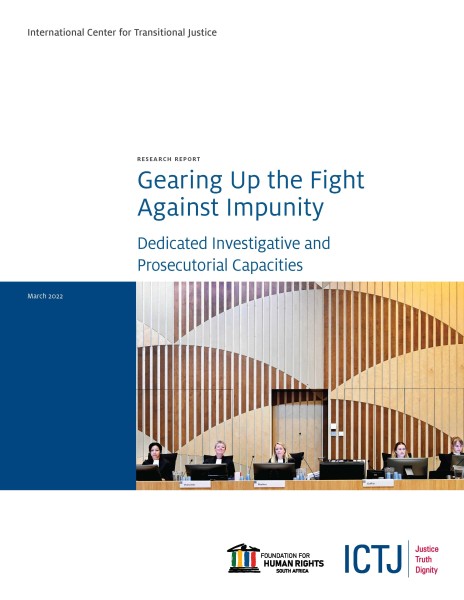We work side by side with victims to obtain acknowledgment and redress for massive human rights violations, hold those responsible to account, reform and build democratic institutions, and prevent the recurrence of violence or repression.
Gearing Up the Fight Against Impunity: Dedicated Investigative and Prosecutorial Capacities
This study explores specialized units established in 23 countries to investigate and prosecute serious international crimes. Notwithstanding the challenges faced by these units, the study concludes that countries with a specialized institutional approach are considerably more successful in bringing perpetrators to justice when compared with countries without dedicated capacities. The report also analyses how specialized units have been instrumental in bringing justice to victims of the Syrian conflict.

Holding perpetrators to account for the worst crimes known to humanity is one of the most important responsibilities of the community of nations in the 21st century. Notwithstanding the appalling nature of atrocity crimes, most perpetrators do not face justice. Specialized investigative and prosecutorial units, however, offer a ray of hope in this otherwise bleak justice landscape. Such units now operate in several countries around the world, including Argentina, Bosnia and Herzegovina, France, and Germany.
This report, which was prepared jointly by ICTJ and the Foundation for Human Rights emerges from efforts to persuade the South African government to create a dedicated capacity to investigate and prosecute apartheid-era crimes, which have been long neglected. The report considers ways of gearing up the fight against impunity for serious international crimes and crimes of the past. It compares countries that leave atrocity crimes to the general administration of justice and those that adopt a specialized or dedicated approach.
Specialized prosecutorial and investigative capacities are entities that focus exclusively on a particular category of crimes. While specialized units vary in size, structure, staffing, and operations, innovations such as prosecution-led investigations and bringing multi-disciplinary skills under one roof, make them considerably more effective than a generalized approach.
The report provides a high-level audit of specialized units in 23 countries. It considers different models of domestic dedicated investigative and prosecutorial approaches and analyses their track records. Eleven case studies contrast countries with specialized units and those without. The report examines certain features that characterize specialized units, including their structure, composition, operations, and relationships with civil society and other entities. It analyzes the main challenges faced by the units including political dynamics, accessing evidence, and victim support. The report includes an overview of recent efforts by various specialized units to deliver criminal accountability for serious crimes committed in Syria. It concludes with recommendations on how to make specialized units more effective.